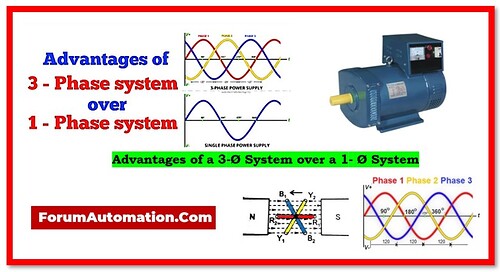The three-phase system contains three live wires that supply 440V to the major users.
The single-phase system has single live conductor that is utilized for residence purposes. The following are the primary advantages of a three-phase system over a single-phase system.
1). Constant Power
In circuits with a single phase, the power that is provided has a pulsing pattern. Even when both voltage & current are in phase with one another, there are still two points in each cycle where there is no power. However, the power provided by a polyphase system is nearly constant whenever the loads are in a balanced condition.
2). Economic Aspects of Power Transmission
To transfer the same amount of power over the same distance at the same voltage using a three-phase system takes just 75% of the quantity of conducting material that is necessary to do so using a single-phase system.
3). Higher Rating
A three-phase machine’s rating, or output, is almost 1.5 times more than that of a single-phase machine of equal size.
4). Alternator Dimensions & Weight
In comparison to a single-phase alternator, the dimensions of a three-phase alternator are much more compact, and its weight is significantly lower.
5). Advantages of Three-Phase Induction Motors
Due to the advantages listed below, three-phase induction motors are used in a wide range of industrial applications.
- Single phase induction motors cannot start themselves, however 3 phase induction motors can. As a result, the 1 -phase motor requires some additional methods to start at the first stage since it lacks starting torque.
- Compared to single phase induction motors, 3-phase induction motors provide a better power factor and efficiency.
6). Frequency of Vibration
When compared to a single-phase motor, a three-phase motor has a lower frequency of vibrations. This is because, in a single-phase motor, the amount of power delivered is dependent on the current and fluctuates all the time.
7). Torque
When compared to a single-phase system, a three-phase system generates a torque that is either steady or uniform, whereas a single-phase system generates pulsing torque.
8). Requirement of Copper & Aluminium
When compared to a single-phase transmission system, a three-phase system requires a significantly lesser quantity of copper and aluminium to be used in the transmission system.
9). Dependency
It is possible for a single-phase load to be efficiently supplied by a three-phase load or system; however, a three-phase system cannot depend on or be fed by a single-phase system.
